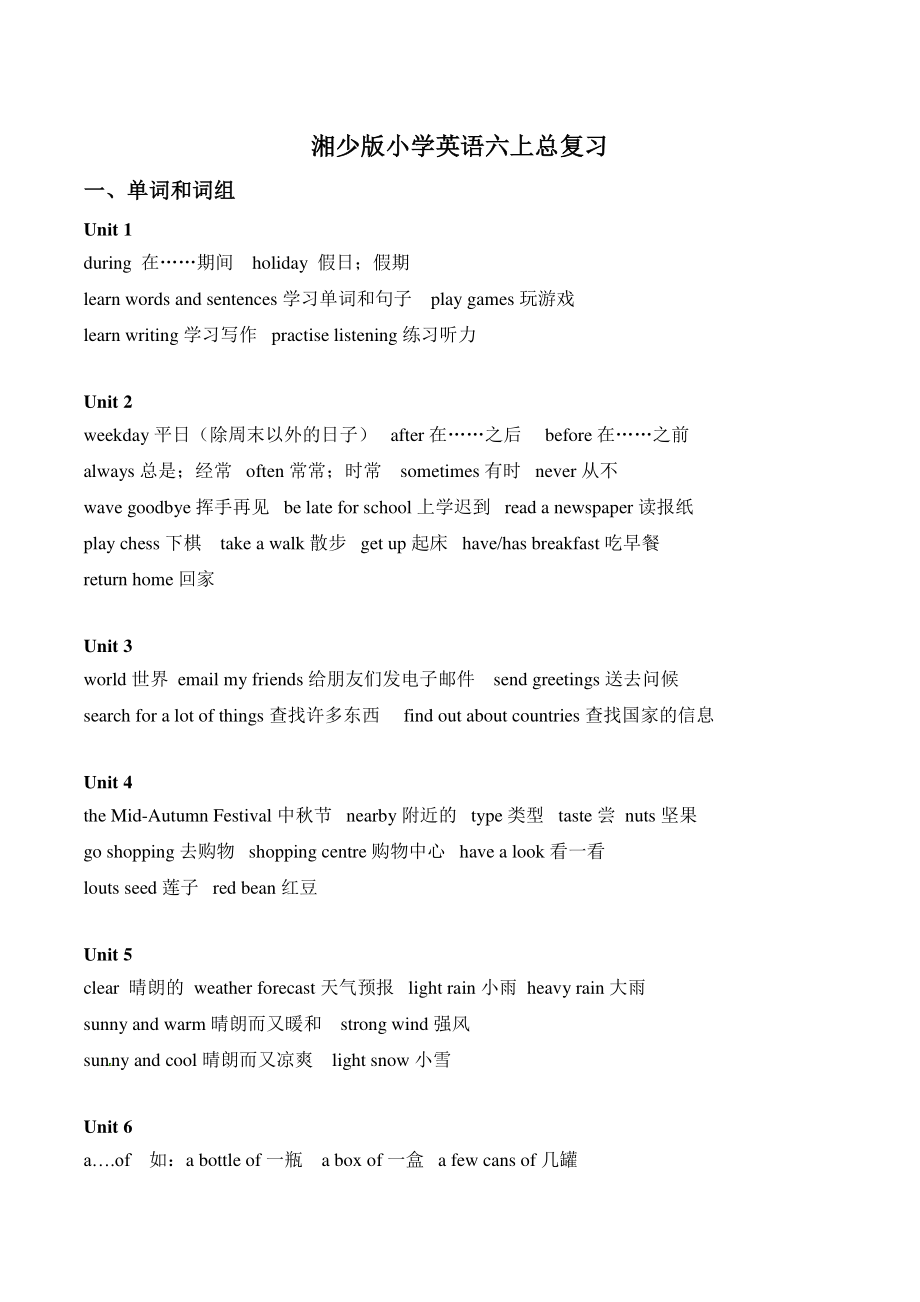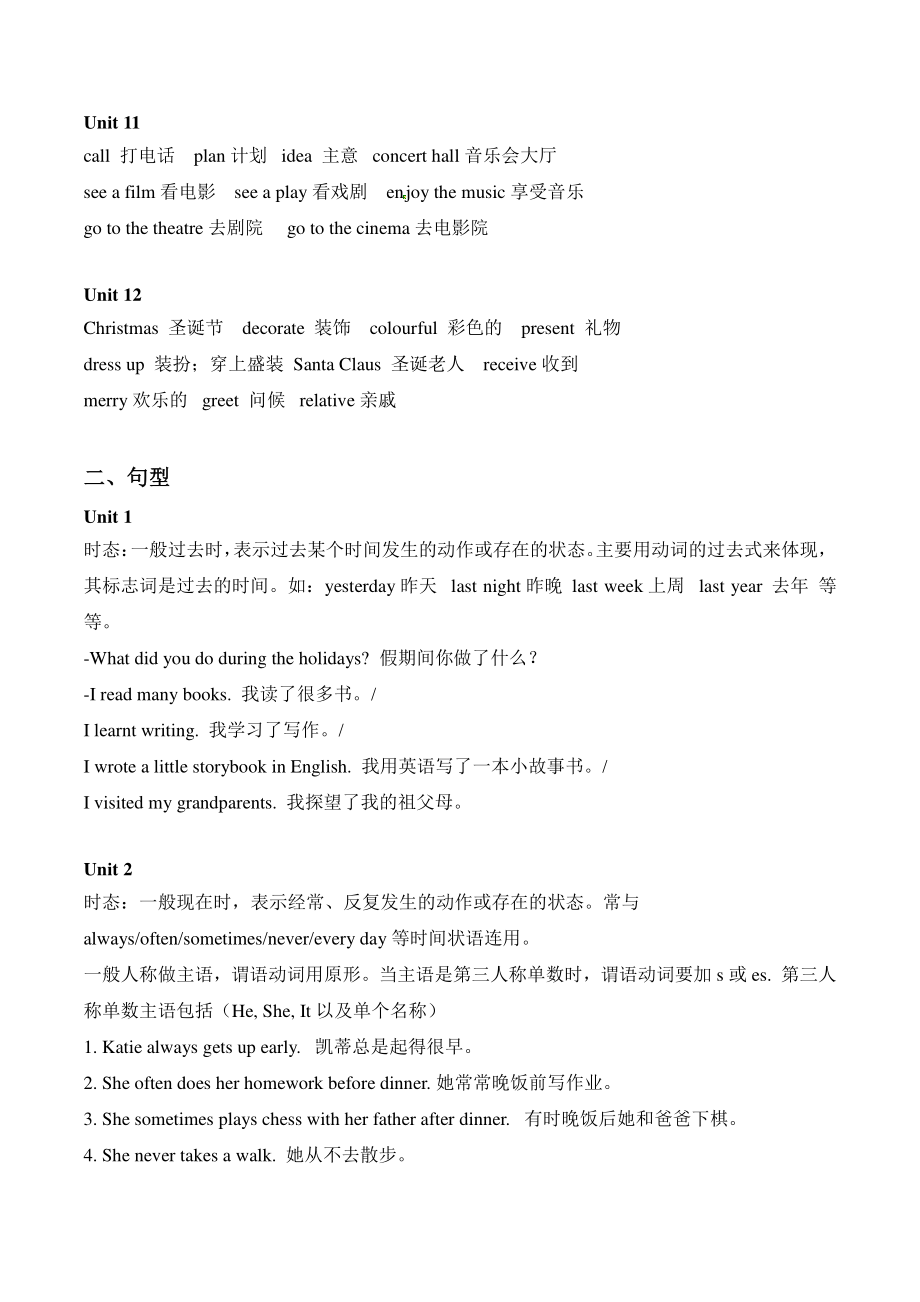 2021年湘少版小学英语六年级上期末总复习(单词+词组+句型)
2021年湘少版小学英语六年级上期末总复习(单词+词组+句型)
《2021年湘少版小学英语六年级上期末总复习(单词+词组+句型)》由会员分享,可在线阅读,更多相关《2021年湘少版小学英语六年级上期末总复习(单词+词组+句型)(6页珍藏版)》请在七七文库上搜索。
1、湘少版小学英语六上总复习湘少版小学英语六上总复习 一、单词和词组一、单词和词组 Unit 1 during 在期间 holiday 假日;假期 learn words and sentences 学习单词和句子 play games 玩游戏 learn writing 学习写作 practise listening 练习听力 Unit 2 weekday 平日(除周末以外的日子) after 在之后 before 在之前 always 总是;经常 often 常常;时常 sometimes 有时 never 从不 wave goodbye 挥手再见 be late for school 上学迟
2、到 read a newspaper 读报纸 play chess 下棋 take a walk 散步 get up 起床 have/has breakfast 吃早餐 return home 回家 Unit 3 world 世界 email my friends 给朋友们发电子邮件 send greetings 送去问候 search for a lot of things 查找许多东西 find out about countries 查找国家的信息 Unit 4 the Mid-Autumn Festival 中秋节 nearby 附近的 type 类型 taste 尝 nuts 坚果
3、go shopping 去购物 shopping centre 购物中心 have a look 看一看 louts seed 莲子 red bean 红豆 Unit 5 clear 晴朗的 weather forecast 天气预报 light rain 小雨 heavy rain 大雨 sunny and warm 晴朗而又暖和 strong wind 强风 sunny and cool 晴朗而又凉爽 light snow 小雪 Unit 6 a.of 如:a bottle of 一瓶 a box of 一盒 a few cans of 几罐 a few bars of 几条 a piec
4、e of 一张 a bowl of 一碗 a cup of 一杯 Unit 7 an old man 一个老头 an old woman 一个老奶奶 the old people 老人 weak 弱的 slow 慢的 make tea 泡茶 make cakes 做蛋糕 help old people on the road 帮助老人过马路 clean their houses 打扫他们的房子 make them happy 让他们快乐 help them to get on or off the bus 帮助他们上下车 help them to carry things 帮助他们拿东西 Un
5、it 8 blouse 女式短上衣 enough 足够的 save 节约 drop(一)滴 keep the rivers clean 保持河流干净 keep the air clean and fresh 保持空气干净和清新 plant more trees 多植树 should 应该 should not=should t 不应该 should t kill wild animals 不应该杀野生动物 should t waste water 不应该浪费水 should t litter 不应该乱扔垃圾 Unit 9 原级 比较级 最高级 原级 比较级 最高级 big bigger big
6、gest small smaller smallest tall taller tallest short shorter shortest long longer longest fast faster fastest loud louder loudest Unit 10 rest 休息 just 只是;仅仅 dont feel well 感觉不舒服 have a cough 咳嗽 have a headache 头疼 have a fever 发烧 take medicine 吃药 have a good rest 好好休息 see a doctor 看医生 drink more wat
7、er 多喝水 Unit 11 call 打电话 plan 计划 idea 主意 concert hall 音乐会大厅 see a film 看电影 see a play 看戏剧 enjoy the music 享受音乐 go to the theatre 去剧院 go to the cinema 去电影院 Unit 12 Christmas 圣诞节 decorate 装饰 colourful 彩色的 present 礼物 dress up 装扮;穿上盛装 Santa Claus 圣诞老人 receive 收到 merry 欢乐的 greet 问候 relative 亲戚 二、句型二、句型 Un
8、it 1 时态: 一般过去时, 表示过去某个时间发生的动作或存在的状态。 主要用动词的过去式来体现,其标志词是过去的时间。如:yesterday 昨天 last night 昨晚 last week 上周 last year 去年 等等。 -What did you do during the holidays? 假期间你做了什么? -I read many books. 我读了很多书。/ I learnt writing. 我学习了写作。/ I wrote a little storybook in English. 我用英语写了一本小故事书。/ I visited my grandpare



- 配套讲稿:
如PPT文件的首页显示word图标,表示该PPT已包含配套word讲稿。双击word图标可打开word文档。
- 特殊限制:
部分文档作品中含有的国旗、国徽等图片,仅作为作品整体效果示例展示,禁止商用。设计者仅对作品中独创性部分享有著作权。
- 关 键 词:
- 2021 年湘少版 小学英语 六年级 上期 复习 单词 词组 句型
 七七文库所有资源均是用户自行上传分享,仅供网友学习交流,未经上传用户书面授权,请勿作他用。
七七文库所有资源均是用户自行上传分享,仅供网友学习交流,未经上传用户书面授权,请勿作他用。



 浙公网安备33030202001339号
浙公网安备33030202001339号
链接地址:https://www.77wenku.com/p-204378.html